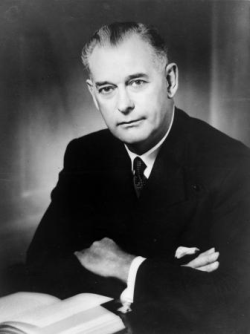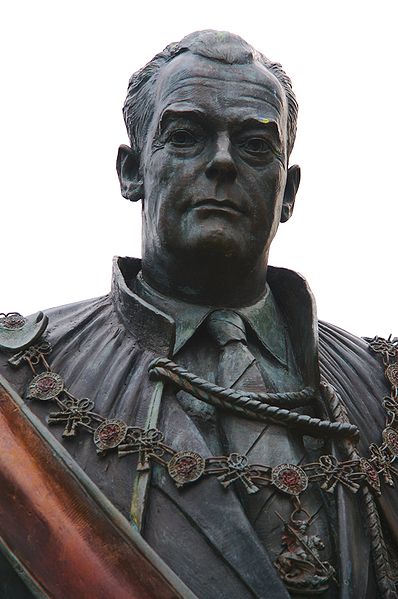<Back to Index>
- Inventor Thomas Alva Edison, 1847
- Writer Bernard le Bovier de Fontenelle, 1657
- Prime Minister of New Zealand Keith Jacka Holyoake, 1904
PAGE SPONSOR



Sir Keith Jacka Holyoake, KG, GCMG, CH, QSO, KStJ (11 February 1904 – 8 December 1983) was a New Zealand politician. The only person to have been both Prime Minister and Governor - General of New Zealand, Holyoake was National Party Prime Minister from 20 September 1957 to 12 December 1957, then again from 12 December 1960 to 7 February 1972. He was appointed as Governor - General in 1977 and served until 1980.
Holyoake was the third longest serving New Zealand Prime Minister (just under 12 years), surpassed only by Richard Seddon's 13 years and William Massey's close to 13 years; he was also the first to be born in the 20th century. He was known for his diplomatic style and "plummy" voice. He was also fondly (or mockingly) known as Kiwi Keith, a name given to him in childhood to distinguish him from an Australian child with the same name. Holyoake was born at Mangamutu, a short distance from Pahiatua, a town in New Zealand's Wairarapa region,
the son of Henry Victor Holyoake and Esther Eves. The Holyoakes
great-grandparents settled in the district in 1843, and were relatives
of 19th century radical George Holyoake. The Holyoakes ran a small general store and consequentially moved around the country often. His family lived for a time in both Hastings and Tauranga, but in 1913, settled in Riwaka, near Motueka. At age 12, having left school after his father's death, Holyoake worked on the family hop and tobacco farm
in Riwaka. His mother had trained as a school teacher, and continued
his education at home. After taking over the management of the farm, he
became involved in various local farming associations, something that
increased his interest in politics. The Reform Party, which had strong rural support, selected Holyoake as its candidate for the Motueka seat in the 1931 election. The incumbent MP, George Black, held the seat, but died the following year. Holyoake was the Reform Party's candidate in the resulting by-election in 1932, and was successful. He became the youngest Member of Parliament at the time, at the age of 28. In the 1935 election, Holyoake retained his seat under the motto "Follow England and Vote Holyoake" despite
a massive swing against the Reform - United coalition. In the aftermath
of this election, he played a key role in transforming the coalition
into the modern National Party.
He very quickly gained considerable respect from his colleagues, and
was regarded as a rising star in the new party. But in the 1938 election, Holyoake lost his seat to a rising star of the governing Labour Party, Gerry Skinner. In 1943 he returned to Parliament as MP for Pahiatua, having been lined up by National for that nomination. In 1946, he became the party's Deputy Leader. National won the1949 election and formed the First National Government, new Prime Minister Sidney Holland appointed Holyoake as Minister of Agriculture. Holyoake was also for a year (1949 – 50) in charge of the Department of Scientific and Industrial Research, and was Minister of Marketing until the department was abolished in 1953. As
Minister of Agriculture for eight years Holyoake enhanced his
reputation as a level-headed good administrator. Farm mechanisation was
encouraged, the "extermination policy" achieved nearly eliminated the
rabbit pest. Dismantling of marketing producer controls was completed. Holyoake twice went to London re-negotiate price levels on meat and wool products, and in 1955 attended the Food and Agricultural Organisation conference in Rome. On his return to New Zealand he visited India and the USSR to seek alternative markets for New Zealand, although his trip bore little fruit. In 1957 he led a delegation seeking to protect New Zealand's access to the British market without notable success. As
Deputy leader of the National Party, Holyoake was acting prime minister
whenever Holland was overseas. In recognition of this was made a member
of the Privy Council in 1954, only after the 1954 general election Holland made him the first person to be formally appointed Deputy Prime Minister.
Holyoake became Prime Minister a two months before the 1957 election, when outgoing Prime Minister Sidney Holland retired
due to ill-health. The election was won by the Labour Party by a margin
of one seat, and Holyoake was Leader of the Opposition for three years. National was returned to power in the 1960 election, in a victory attributed to Holyoake's skillful campaigning, particularly his attacks on Minister of Finance Arnold Nordmeyer's
so-called "Black Budget", which increased taxes on petrol, cigarettes
and liquor. Holyoake's second term was typified by a long period of
prosperity and economic expansion. However, increasing social
liberalism and moves by the United Kingdom to join the European Economic Community challenged his Government. Holyoake's government rewrote the criminal legal code, passing the Crimes Act 1961. One of the main features of this act was the abolition of capital punishment,
though only ten National MPs voted for its abolition. His government
also introduced a form of voluntary unionism, but the majority of
industrial workplaces remained unionised. The Government was
comfortably re-elected for a second term in 1963, losing two seats. In 1966 Holyoake's Government sent limited military support to the Vietnam War. This decision lead to bitter scenes at the 1966 general election, although National only lost one seat. Holyoake appointed a rising backbencher, Robert Muldoon as
Minister of Finance in 1967, although ranked him lowly in his Cabinet.
In response to falling wool prices and balance of payment problems,
Muldoon introduced mini-budgets with Holyoake's approval. The Government was narrowly re-elected at the 1969 general election.
Most of Holyoakes 'lieutenants' had resigned or died. On 2 February
1972 Holyoake announced his resignation, stepping down as Prime
Minister to ease the succession for his deputy and friend, Jack Marshall. When National under Marshall was defeated, Holyoake remained prominent in Opposition. He played an active part in the 1975 election, which saw National regain power again under Robert Muldoon. Muldoon appointed Holyoake to the specially created sinecure of Minister of State. In 1977, Holyoake was unexpectedly and controversially appointed Governor - General by Queen Elizabeth II on the advice of the then Prime Minister Robert Muldoon. The announcement was made by the Queen at the end of her tour of New Zealand on 7 March 1977, from the Royal Yacht HMY Britannia in Lyttelton Harbour. This
choice was deemed controversial by some, as Holyoake was a sitting
Cabinet minister and former Prime Minister. Many opponents of Muldoon's
government claimed that it was a political appointment. The Leader of
the Opposition, Bill Rowling stated that he would remove Holyoake as Governor - General should the Labour Party win the 1978 general election, and openly suggested that he would have appointed Sir Edmund Hillary as Governor - General. This suggestion was in turn criticised by the Government, as Sir Edmund had backed Labour in 1975 as part of the "Citizens for Rowling" campaign. As a result of the appointment, Holyoake resigned from Parliament, leading to the Pahiatua by-election of 1977. He was succeeded from his seat by John Falloon. Holyoake's
conduct while in office, however, was acknowledged to be fair and
balanced. In particular, Holyoake refused to comment on the 1978
general election, which gave Labour a narrow plurality of votes but a
majority to National. Social Credit leader Bruce Beetham said Holyoake as Governor - General had "a scrupulous impartiality that confounded the critics of his appointment". His
term as Governor - General was only for three years, on account of his
age. Usually Governors - General serve for five years, but Holyoake was
the oldest Governor - General to date. His term ended in 1980.
He died on 8 December 1983, aged 79, in Wellington. His daughter Diane married National MP Ken Comber.